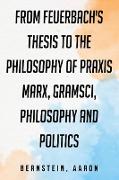- Start
- From Feuerbach's Thesis to the Philosophy of Praxis
From Feuerbach's Thesis to the Philosophy of Praxis
Angebote / Angebote:
The Prison Notebooks of Antonio Gramsci, composed in a Fascist prison cell in the late 1920's and early 1930's, have now come to enjoy an immense popularity and widespread diffusion on an international scale. As Joseph Buttigieg writes, 'Few twentieth century works have elicited as much widespread interest or have had as great an impact on so many diverse field of study as the Quaderni del carcere'.1 In a similar vein, Fabio Frosini has spoken of a "worldwide Gramscian web", in which the study of Gramsci's thought is no longer simply an Italian or European phenomenon, but has become truly global.2 And yet, as others have noted, 3 this widespread diffusion and popularity has not necessarily been accompanied by close, philologically precise analyses of the Notebooks. This is particularly the case in the English-speaking world due to the absence of a full English translation of Valentino Gerratana's 1975 critical edition of Gramsci's Notebooks, rightly described by Buttigieg as 'the single most important event in the publication history of Gramsci's works', 4 as it gave readers access, for the first time, to the Notebooks in the original form in which they were written.5 Consequently, despite the considerable portion of Gramsci's writings translated into English, these have largely remained confined to thematic anthologies and selections re-organized by the editors and which therefore, do not reflect Gramsci's original manuscripts, with the exception of Buttigieg's far from complete project of producing a critical edition of the Notebooks in English.
Folgt in ca. 10 Arbeitstagen
